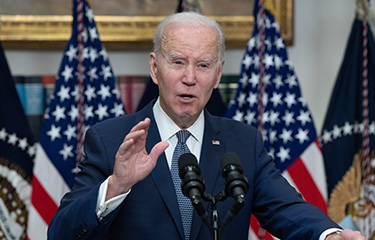U.S. President Joe Biden will not issue an embargo on Mexican wildlife products, which he was entitled to do after Mexico was found in breach of a U.S. law requiring federal action against countries found to be violating the Convention on International Trade in Endangered Species of Wild Fauna and Flora (CITES).
The U.S. Secretary of the Interior’s Department of Fish and Wildlife found Mexico in breach of the Pelly Amendment in May 2023, requiring Biden to decide whether to take punitive trade action against Mexico or explain his reason for not doing so. Mexico has not adequately protected the critically endangered totoaba from fishing or trading, which has “diminished the effectiveness” of CITES, according to the declaration. Illegal fishing for the totoaba has also resulted in the deaths of numerous critically endangered vaquita porpoises.
In lieu of an embargo or other trading restrictions, Biden called for a high-level dialogue between the U.S. and Mexico on protecting the totoaba and vaquita.
“Through this dialogue, the United States will encourage Mexico to strengthen and implement its CITES compliance action plan and comply with all relevant CITES decisions regarding totoaba and vaquita, including expansion of enforcement efforts beyond the zero-tolerance area [for commercial fishing],” Biden wrote in a letter to the speaker of the U.S. House and president of the U.S. Senate. “The United States will also establish a schedule of at least quarterly meetings with the government of Mexico to review its CITES Compliance Action Plan implementation, with a focus on enhanced monitoring and enforcement actions to prevent and deter totoaba fishing and trafficking, including seizures, arrests, and prosecutions. The United States will also include totoaba and vaquita enforcement matters on the agenda for the next High Level Security Dialogue with Mexico.”
Biden also ordered U.S. agencies to assist and support Mexico’s training and capacity-building on compliance, anti‑trafficking, anti-corruption, and other measures if Mexico requested it, and asked the U.S. secretary of the interior, the U.S. secretary of commerce, the U.S. secretary of state, and the United States trade representative to develop an assessment of Mexico’s enforcement actions and the implementation of its CITES Compliance Action Plan by July 2024.
“I am not directing the secretary of the treasury to impose trade measures on Mexican products for the activities that led to the certification by the secretary of the interior at this time because the actions outlined above are the appropriate means to address this issue,” Biden wrote. “The report will be used as the basis for assessing whether additional steps, including potential trade restrictions, will be necessary.”
In a joint statement, the Animal Welfare Institute, the Natural Resources Defense Council, and the Center for Biological Diversity criticized the decision.
“I’m disappointed in the U.S. government for doing so little to save vaquitas from extinction,” Center for Biological Diversity International Program Director Sarah Uhlemann said. “These are the rarest marine mammals in the world, and yet the United States has let the Mexican government off the hook again. Mexico has a long, painful history of failed promises on protecting these little porpoises. The United States needs to apply the strongest pressure and ban seafood from Mexico until there’s real enforcement on illegal fishing in their habitat. The last 10 vaquitas are at stake.”
For decades, Mexico has failed to adequately enforce its fishing and wildlife trade laws in the Upper Gulf, causing the vaquita to decline from nearly 600 animals in 1997 to only around a dozen today, according to Natural Resources Defense Council Global Biodiversity Conservation Director Zak Smith.
“Seven years ago, Mexico promised the United States that it would permanently ban the use of gillnets in all fisheries throughout the vaquita’s range,” Smith said. “Today, gillnets are still routinely used in vaquita habitat and the species’ population has plummeted to around 10 individuals. The United States should be using all the tools at its disposal, including an embargo on targeted products, to compel Mexico to meet its international obligations and save the species.”
Animal Welfare Institute Wildlife Biologist DJ Schubert said there has been a reduction in illegal fishing in the core vaquita habitat of the zero-tolerance area, but that illegal fishing continues in the Upper Gulf, including in the vaquita refuge and gillnet prohibition area. Schubert said updated fishing regulations issued by the Mexican government in September 2020 regulations have not been fully implemented or enforced.
The three groups pledged continued vigilance on the issue, including possible further legal action, if the U.S. and Mexico do not take further action to protect the vaquita and totoaba.
“With only a dozen vaquita remaining, the Biden administration must remain vigilant, and ensure that Mexico does not continue to evade its CITES responsibilities,” Schubert said. “We believe that strong sanctions against Mexico are warranted, and we will continue to demand that the United States exercise all options to ensure Mexico does everything in its power to save the vaquita. The U.S. public will not tolerate our government being complicit in the extinction of a species.”
Photo courtesy of Consolidated News Photos/Shutterstock







